Posted: January 17th, 2014 | Author: Sven | Filed under: found on the net, Report | Tags: Knowledge Exchange | Comments Off on Knowledge Exchange released Discussion paper on Open Knowledge
 Knowledge Exchange (KE) – a cooperation of five national funding organisations (DFG, Surf, DEFF, CSC and JISC) – has been founded in 2005 to improve the digital infrastructure for information and communication technology as it relates to the research and university library sectors. Since 2005 KE is very active in multiple areas. These areas are clearly intended to encourage open access to the tools of science and scholarship for the higher education and research communities. They also contribute toward building an integrated e-infrastructure and exploring new developments in the future of publishing. There is a specific focus is on the development of storage, accessibility and quality assurance of digitally published research data. Another area of activity is directed at exploring effective investment in research tools (like interoperability standards; research data; research tools and sustainable business models for Open Access. Read the rest of this entry »
Knowledge Exchange (KE) – a cooperation of five national funding organisations (DFG, Surf, DEFF, CSC and JISC) – has been founded in 2005 to improve the digital infrastructure for information and communication technology as it relates to the research and university library sectors. Since 2005 KE is very active in multiple areas. These areas are clearly intended to encourage open access to the tools of science and scholarship for the higher education and research communities. They also contribute toward building an integrated e-infrastructure and exploring new developments in the future of publishing. There is a specific focus is on the development of storage, accessibility and quality assurance of digitally published research data. Another area of activity is directed at exploring effective investment in research tools (like interoperability standards; research data; research tools and sustainable business models for Open Access. Read the rest of this entry »
Posted: November 1st, 2013 | Author: Sven | Filed under: EDaWaX, Report | Tags: RDM, research data centres, WP3 | 2 Comments »
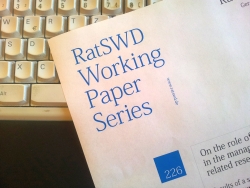 Our project currently has published the results of our work package 3 in which we analyzed the role of research data centres with regard to management of publication-related research data. This working paper presents the results of a survey among these scientific infrastructure service providers.
Our project currently has published the results of our work package 3 in which we analyzed the role of research data centres with regard to management of publication-related research data. This working paper presents the results of a survey among these scientific infrastructure service providers.
By conducting a desk research and an online survey, we found out that almost three quarters of all responding research data centres, archives and libraries generally store externally generated research data – what also applies to publication-related data.
Almost 75% of all respondents also store and host the code of computation (the syntax of statistical analyses). If self-compiled software components have been used to generate research outputs, only 40% of all respondents accept these software components for storing and hosting.
Eight in ten institutions also stated that they are taking specific actions for digital long-term preservation of their data. In regard to the documentation of stored and hosted research data almost 70% of all respondents claimed to use the metadata schema of the Data Documentation Initiative (DDI); Dublin Core was used by 30 percent (multiple answers were permitted). Almost two thirds also used persistent identifiers to facilitate citation of these datasets. Three in four respondents also stated to support researchers in creating metadata for their data. Application programming interfaces (APIs) for uploading or searching datasets currently have not been implemented by any of the respondents yet. Little widespread is the use of semantic technologies like RDF.
A German version of the paper is also available.
Photo: S. Vlaeminck. License: CC-BY-SA 3.0 DE
Posted: October 29th, 2013 | Author: Sven | Filed under: Data Sharing, Report, Research Data | Tags: access to data, Data Sharing, European Commission, Open Data | Comments Off on European Commission held public Consultation on Open Research Data
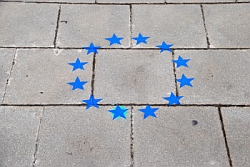 The European Commission (EC) held a public consultation on open research data. For that purpose the Commission invited stakeholders from various branches and researchers, the industry, funders, libraries, publishers, infrastructure developers and other stakeholders joined the meeting on 2 July in Brussels.
The European Commission (EC) held a public consultation on open research data. For that purpose the Commission invited stakeholders from various branches and researchers, the industry, funders, libraries, publishers, infrastructure developers and other stakeholders joined the meeting on 2 July in Brussels.
The commission posed five questions to structure the debate. These questions included basic questions like “how research data can be defined?”. But a lion’s share of the questions dealt with the “openness” of data: What types of data should be openly available? When and how does openness need to be limited?
In addition other important questions from the perspective of infrastructure service providers were mentioned. How should research data be stored and made accessible? How should the issue of data re-use be addressed? And finally a question I personally characterize as a very important topic: How can we enhance data awareness and a culture of data sharing?
Read the rest of this entry »
Posted: October 11th, 2013 | Author: Sven | Filed under: Conference, EDaWaX, Report | Tags: Research Data, research paper | Comments Off on EDaWaX: State of affairs
 As you might have noticed, currently I don’t have much time to publish new articles on the blog. The reason is that our project is currently publishing a lot of the results we achieved in the course of the last two years.
As you might have noticed, currently I don’t have much time to publish new articles on the blog. The reason is that our project is currently publishing a lot of the results we achieved in the course of the last two years.
One of these publications has been published yesterday – it is a nice summary of the project’s main results, but still not all of them. The paper “Replizierbare Forschung in den Wirtschaftswissenschaften erhöhen – Eine Herausforderung für wissenschaftliche Infrastrukturdienstleister” is available online. Read the rest of this entry »
Posted: August 28th, 2013 | Author: Sven | Filed under: found on the net, Report | Tags: European Commission, open access, Open Data | Comments Off on European Commission: Open access to research publications reaching ‘tipping point’…but what about the data?
 The European Commission (EC) has released a press statement in which the EC claimed that “the global shift towards making research findings available free of charge for readers—so-called ‘open access’ is reaching ‘tipping point’.”
The European Commission (EC) has released a press statement in which the EC claimed that “the global shift towards making research findings available free of charge for readers—so-called ‘open access’ is reaching ‘tipping point’.”
This enthusiastic view of the Commission is based on three studies that that have been funded by the EC:
One study analysed the growth of open access publications, a second evaluated the strategies of funders to enforce open access and the a third addressed open access to scientific data. Read the rest of this entry »
Posted: July 23rd, 2013 | Author: Sven | Filed under: found on the net, German, Report | Tags: infrastructure, Research Data | 1 Comment »
 The German project RADIESCHEN / radish (Rahmenbedingungen einer disziplinübergreifenden Forschungsdateninfrastruktur /Framework for an inter-disciplinary research data infrastructure) has published the project’s synthesis in English. The objective of this DFG-funded project was the development of a roadmap and recommendations for a multi-disciplinary research data infrastructure in Germany.
The German project RADIESCHEN / radish (Rahmenbedingungen einer disziplinübergreifenden Forschungsdateninfrastruktur /Framework for an inter-disciplinary research data infrastructure) has published the project’s synthesis in English. The objective of this DFG-funded project was the development of a roadmap and recommendations for a multi-disciplinary research data infrastructure in Germany.
The project team identified requirements for generic components of existing infrastructures and potential for cross-linking of multi-disciplinary components. The resulting analysis is based on a survey of existing and new projects and includes measures for community building. Key aspects of the analysis are the technical components of the infrastructure, the cost model and the investigation of cross-disciplinary topics.
Photo: “Lachdieschen” by dwarslöper / flickr.com. License: CC-BY-NC-SA 2.0 DE
Posted: April 16th, 2013 | Author: Sven | Filed under: Report, Workshop | Tags: Knowledge Exchange, Report, Research Data | 1 Comment »
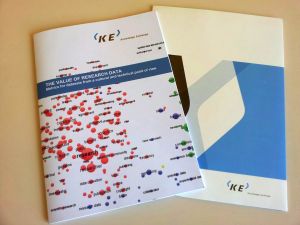 Last week I’ve been in Berlin and took part in the workshop “Making Data Count: Research data availability and research assessment” hosted by Knowledge Exchange (KE), a 2005 established cooperation between five research funders.
Last week I’ve been in Berlin and took part in the workshop “Making Data Count: Research data availability and research assessment” hosted by Knowledge Exchange (KE), a 2005 established cooperation between five research funders.
The aim of the workshop was to bring experts and stakeholders from research institutions, universities, scholarly societies and funding agencies together in order to review, discuss and build on possibilities to implement the culture of sharing and to integrate publication of data into research assessment procedures. Read the rest of this entry »
Posted: February 11th, 2013 | Author: Sven | Filed under: journals, Report | Tags: academic publishing, Citation, recommendations, supplements | Comments Off on NISO and NFAIS publish Recommended Practice on Online Supplemental Journal Article Materials
 The National Information Standards Organization (NISO) and the National Federation for Advanced Information Services (NFAIS) have published a new Recommended Practice on Online Supplemental Journal Article Materials (NISO RP-15-2013).
The National Information Standards Organization (NISO) and the National Federation for Advanced Information Services (NFAIS) have published a new Recommended Practice on Online Supplemental Journal Article Materials (NISO RP-15-2013).
Supplemental materials are increasingly being added to journal articles, but until now there has been no recognized set of practices to guide in the selection, delivery, discovery, and preservation of these materials.
To address this gap, NISO and NFAIS jointly sponsored an initiative to establish best practices that would provide guidance to publishers and authors for management of supplemental materials and would address related problems for librarians, abstracting and indexing services, and repository administrators.
The Supplemental Materials project involved two teams working in tandem: one to address business practices and one to focus on technical issues. This new publication is the combined outcome of the two groups’ work.
Read the rest of this entry »
Posted: October 12th, 2012 | Author: Sven | Filed under: Report | Tags: data management, Report, Research Data | Comments Off on GESIS publishes “Guidelines for the Management of Research Data – Social Sciences Survey Data”
 GESIS – the Leibniz Institute for the Social Sciences has just released the technical report “Guidelines for the management of research data – social sciences survey data.”
GESIS – the Leibniz Institute for the Social Sciences has just released the technical report “Guidelines for the management of research data – social sciences survey data.”
The report is available in German only, but the eighty pages thick document covers a lot of important topics:
Starting with some general recommendations for the exploration of the data available at an institution and issues of privacy protection and responsibility for research data, the report also provides a useful checklist for the management of research data in the first chapter.
Other chapters deal with organisational and technical aspects of data preparation and documentation (chapter 2) or organisational and technical issues of safeguarding data and documents (chapter 3).
Chapter 4 discusses metadata standards, focussing on DDI (Data Documentation Initiative) and persistent identificators (DOI -> da|ra, DataCite). Chapter 5 covers perpetual access to research data and some legal questions. The report concludes with an overview of the services GESIS provides for the management of research data, e.g. digital long-term preservation.
Posted: August 27th, 2012 | Author: Sven | Filed under: Projects, Report | Tags: data citation, Research Data, roles for libraries | Comments Off on ODE Project: New Report on on Best Practices for Citability of Data and on evolving Roles in scholarly Communication
 With the ever increasing availability of data, the best way to ensure its sharing and re-use is becoming a prominent issue. Finding data and understanding data are the first steps in such a process and good data citation is an important prerequisite to enable this. New roles are evolving to support researchers in this process with support in managing, archiving, discovering, interpreting and citing data. Read the rest of this entry »
With the ever increasing availability of data, the best way to ensure its sharing and re-use is becoming a prominent issue. Finding data and understanding data are the first steps in such a process and good data citation is an important prerequisite to enable this. New roles are evolving to support researchers in this process with support in managing, archiving, discovering, interpreting and citing data. Read the rest of this entry »
Posted: June 13th, 2012 | Author: Sven | Filed under: Projects, Report | Tags: big data, humanties, social sciences | Comments Off on Big Data in the Humanities and Social Siences? Yes – there’s a bunch of it!
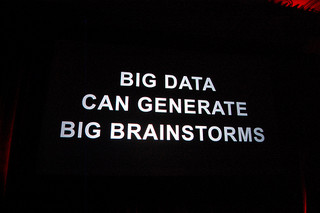 The Council on Library and Information Resources (CLIR) issued the first public appraisal of the Digging into Data Challenge, an international grant programme first funded by JISC, the US National Endowment for the Humanities (NEH), the US National Science Foundation and the Canadian Social Sciences and Humanities Research Council.
The Council on Library and Information Resources (CLIR) issued the first public appraisal of the Digging into Data Challenge, an international grant programme first funded by JISC, the US National Endowment for the Humanities (NEH), the US National Science Foundation and the Canadian Social Sciences and Humanities Research Council.
Their findings are presented in a report called One Culture – Computationally Intensive Research in the Humanities and Social Sciences, along with a series of recommendations for researchers, administrators, scholarly societies, academic publishers, research libraries, and funding agencies.
Read the rest of this entry »
Posted: April 17th, 2012 | Author: Sven | Filed under: Report | Tags: academic publishing, European Commission, Open Data, Research Data | 1 Comment »
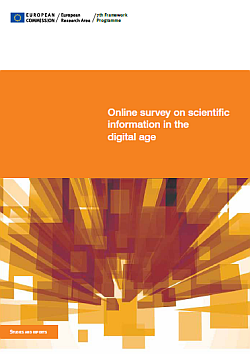 These days, the European Commission has just published the results of a consultation regarding accessibility and preservation of digital publications and research data in the European Union.
These days, the European Commission has just published the results of a consultation regarding accessibility and preservation of digital publications and research data in the European Union.
Commissioner Neelie Kroes, responsible for the digital agenda for Europe, has launched this consultation in July 2011 for seeking views on access to and preservation of digital scientific information – to be more precisely, the survey broached the issues of Open Access for scientific publications, accessibility of research data and digital long term preservation.
The purpose of the consultation was to gather information from as many sources as possible and receive important input for the future development of policy options in the area of scientific information in the digital age.
Read the rest of this entry »
Posted: January 26th, 2012 | Author: Sven | Filed under: Report | Tags: Data Sharing, physical sciences | Comments Off on Report describes information practices in the physical sciences
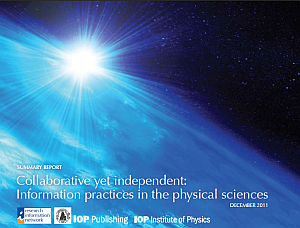 The Research Information Network (RIN), the Institute of Physics (IOP), Institute of Physics Publishing (IOPP) and the Royal Astronomical Society (RAS) in the UK have just commissioned a report that examines information practices in the physical sciences. It follows the previous case studies in the life sciences and the humanities.
The Research Information Network (RIN), the Institute of Physics (IOP), Institute of Physics Publishing (IOPP) and the Royal Astronomical Society (RAS) in the UK have just commissioned a report that examines information practices in the physical sciences. It follows the previous case studies in the life sciences and the humanities.
This report uses seven case studies (particle physics, astrophysics gamma ray burst, nuclear physics, chemistry, earth science, nanoscience and users of the zooniverse platform) to understand how researchers in the physical sciences find, access, use and share information.
In the introduction the authors stated:
Read the rest of this entry »
Posted: November 15th, 2011 | Author: Sven | Filed under: Report | Tags: Knowledge Exchange, Research Data, Vision | 6 Comments »
 Following the report “Riding the Wave: How Europe can gain from the rising tide of scientific data” that was released 2010 by the high level expert group on research data, the Knowledge Exchange (KE) partners have embraced this vision and commissioned a report that translates Riding the Wave into actions for the four partner countries and beyond.
Following the report “Riding the Wave: How Europe can gain from the rising tide of scientific data” that was released 2010 by the high level expert group on research data, the Knowledge Exchange (KE) partners have embraced this vision and commissioned a report that translates Riding the Wave into actions for the four partner countries and beyond.
The report was presented today during a KE workshop in Bonn.
The Report “A Surfboard for Riding the Wave” builds on the 2010 report and presents an overview of the present situation with regard to research data in Denmark, Germany, the Netherlands and the United Kingdom and offers broad outlines for a possible action programme for the four countries in realising the envisaged collaborative data infrastructure.
While the 2010 report of the high level expert group on research data presented a vision for the year 2030, the report of KE concretizes this vision for the four countries.
Read the rest of this entry »
Posted: October 31st, 2011 | Author: Sven | Filed under: Report | Tags: Data Centers, Report, UK | Comments Off on Data centres: their use, value and impact
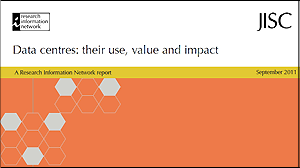 This report provides an analysis of the usage and impact of a number of research data centres, representing a cross-section of research disciplines in the UK.
This report provides an analysis of the usage and impact of a number of research data centres, representing a cross-section of research disciplines in the UK.
The study aimed to demonstrate the importance, relevance and benefits of effective sharing and curation of research data for the UK research community. It looked at the long-term usage and impact of data curated by a cross-disciplinary selection of established data centres.
Using quantitative and qualitative approaches, the study gathered evidence on the extent data centres have been useful to the research community. As part of a wider body of work, this evidence will help to build a case for improving data sharing practice in the UK.
The full report is available at the RIN website or here.
Read the rest of this entry »
 Knowledge Exchange (KE) – a cooperation of five national funding organisations (DFG, Surf, DEFF, CSC and JISC) – has been founded in 2005 to improve the digital infrastructure for information and communication technology as it relates to the research and university library sectors. Since 2005 KE is very active in multiple areas. These areas are clearly intended to encourage open access to the tools of science and scholarship for the higher education and research communities. They also contribute toward building an integrated e-infrastructure and exploring new developments in the future of publishing. There is a specific focus is on the development of storage, accessibility and quality assurance of digitally published research data. Another area of activity is directed at exploring effective investment in research tools (like interoperability standards; research data; research tools and sustainable business models for Open Access. Read the rest of this entry »
Knowledge Exchange (KE) – a cooperation of five national funding organisations (DFG, Surf, DEFF, CSC and JISC) – has been founded in 2005 to improve the digital infrastructure for information and communication technology as it relates to the research and university library sectors. Since 2005 KE is very active in multiple areas. These areas are clearly intended to encourage open access to the tools of science and scholarship for the higher education and research communities. They also contribute toward building an integrated e-infrastructure and exploring new developments in the future of publishing. There is a specific focus is on the development of storage, accessibility and quality assurance of digitally published research data. Another area of activity is directed at exploring effective investment in research tools (like interoperability standards; research data; research tools and sustainable business models for Open Access. Read the rest of this entry »
 Our project currently has
Our project currently has  The European Commission (EC) held a public consultation on open research data. For that purpose the Commission invited stakeholders from various branches and researchers, the industry, funders, libraries, publishers, infrastructure developers and other stakeholders joined the meeting on 2 July in Brussels.
The European Commission (EC) held a public consultation on open research data. For that purpose the Commission invited stakeholders from various branches and researchers, the industry, funders, libraries, publishers, infrastructure developers and other stakeholders joined the meeting on 2 July in Brussels. As you might have noticed, currently I don’t have much time to publish new articles on the blog. The reason is that our project is currently publishing a lot of the results we achieved in the course of the last two years.
As you might have noticed, currently I don’t have much time to publish new articles on the blog. The reason is that our project is currently publishing a lot of the results we achieved in the course of the last two years. The European Commission (EC) has released a
The European Commission (EC) has released a  The German project
The German project 
 The National Information Standards Organization (
The National Information Standards Organization (

 The Council on Library and Information Resources (
The Council on Library and Information Resources ( These days, the European Commission has just published the
These days, the European Commission has just published the  The Research Information Network (
The Research Information Network (
 This report provides an analysis of the usage and impact of a number of research data centres, representing a cross-section of research disciplines in the UK.
This report provides an analysis of the usage and impact of a number of research data centres, representing a cross-section of research disciplines in the UK.





